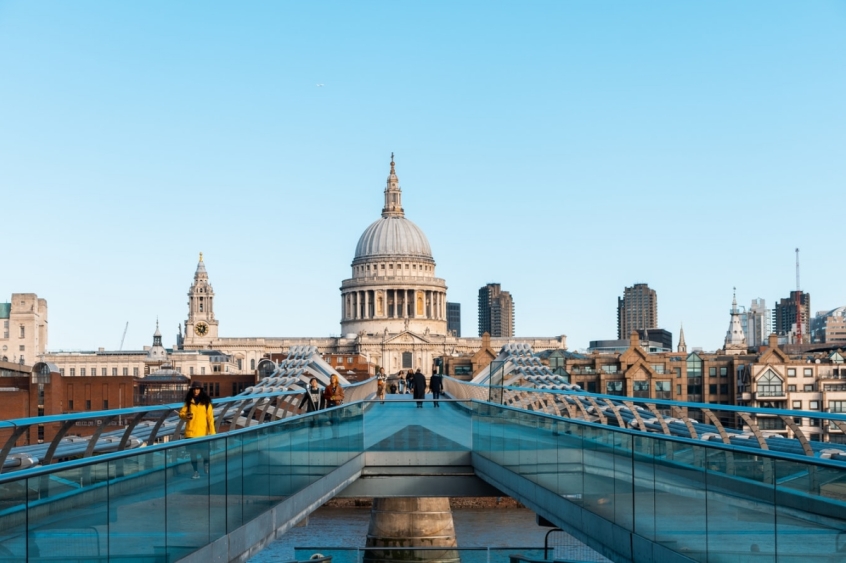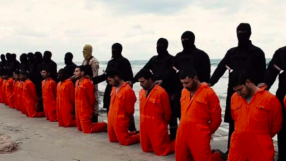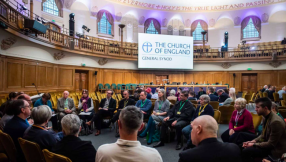
The Bishop of London has said the Church of England should be a safe space for people with opposing theological views on the issues of marriage, gender and sexuality.
Bishop Sarah Mullally's comments were heard during a session at the General Synod looking at these issues.
Synod also heard from LGBT activist Jayne Ozanne who accused conservative Anglicans on General Synod of "transphobic and homophobic rhetoric".
Ms Ozanne, a Synod member for Oxford Diocese and former government adviser on LGBT issues, made her remarks during the question time after a presentation on the Living in Love and Faith (LLF) suite of resources on sexuality, gender identity, relationships and marriage.
The LLF resources, including videos, were published last November to prompt discussions across the Church of England on these issues.
Ms Ozanne told the bishop, who was leading the 'Passing the Baton' session on LLF on the second day of the July Synod: "The LGBT community feel they are constantly being asked to love those who are abusing them and that in itself is abusive.
"There is transphobic and homophobic rhetoric even in these questions coming from people, which we are not even allowed to call transphobic and homophobic.
"I would remind people of what the definition of that is. It is views that are seen as transphobic by the person they are aimed at."
Bishop Mullally replied: "I do agree with you that we have a long way to go to create an environment where we treat each other better.
"I do believe that we need to create a culture which is not racist, is not homophobic, is not transphobic and does not discriminate against women and we do that in an environment where we have a range of different theological beliefs because that is the nature of the Church of England."
In a question before Ms Ozanne's, Dr Ian Paul, a traditionalist and Synod member for Southwell and Nottingham Diocese, asked: "Do you think it is at all helpful or permissible for members of this Synod to describe voices in the videos on LLF as transphobic to seek to silence them?"
Dr Paul did not receive an answer in the LLF session, but in the main question time on Friday he asked the Bishop of London about Debbie Hayton, a transsexual person who featured in an LLF video.
"What action is being taken to protect the important voice and the felt experience of people like Debbie Hayton, who are transsexual but are opposed to transgender ideology, from intimidation and from attempts to silence her?" he asked.
Bishop Mullally replied: "The work that we have done around how we create safer spaces goes for all of us, whatever our theological view and whatever our sexual identity. Ian, you will recognise that one of the concerns I personally have is that in the Church we are not always a safe or nice environment to each other.
"I do think that is at the heart of our culture and culturally we do have to change to be able to support each other, even if we have a different view and a different ideology and that starts with us.
"But the team itself from Living in Love and Faith has spent a lot of time with those who have been involved in the filming of material and we are supporting them as individuals.
"We hope that Living in Love and Faith will be a conversation of love and that goes for all of us and us working out and being self-reflective on how we could have a negative effect on somebody else because of our views and our power base."
The row over alleged transphobia in the LLF materials broke out before the Synod meeting. In a written question circulated to members in advance of the four-day July sessions, Ms Ozanne had asked: "Given the significant distress that Debbie Hayton's film in session 5 of the LLF materials has caused those trans people who have inadvertently been subjected to it, what steps are being taken to protect other trans people from being traumatised by it?"
Bishop Mullally replied: "Thank you for your question. Given the diversity of followers of Jesus Christ portrayed in the LLF resources, many people are likely to find one or more of the films in the LLF Course deeply uncomfortable, if not distressing.
"That is why the LLF resources include a range of ways to help groups and their leaders to take responsibility for engaging with the materials and with each other in as safe and brave a way as possible, modelling loving pastoral care."
The CofE's bishops are expecting the new General Synod, due to be elected for a five-year term in September, to make a decision on whether to change the Church's teaching by the end of 2022.













